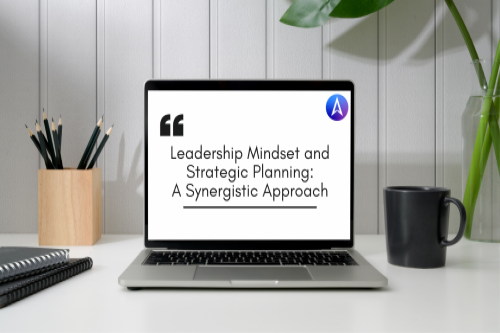
Leadership Mindset and Strategic Planning: A Synergistic Approach
The success of the organization is dependent upon the human capital element of your organizational capacity.

The success of the organization is dependent upon the human capital element of your organizational capacity.

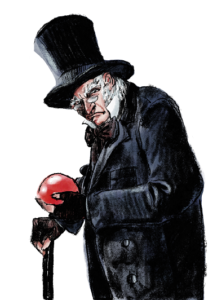
One of the best-loved classics viewed during the Christmas season is Charles Dickens’ A Christmas Carol (see summary here), a story centered around a selfish and unfriendly old man who hates Christmas named Ebenezer Scrooge. It is a story that has been recreated for film, television and the stage more than two dozen times and offers many valuable leadership lessons.
Leadership Lessons from Christmas Past
There is an urban legend regarding an incident about a young pilot in the U.S. Navy who crashed his $38 million F-14 Tomcat and had to appear before the Investigation Board. After providing his perspective on the details of the crash, the young pilot asked an Admiral who was sitting on that Board if he would lose his wings. The Admiral stared at him for a moment and then stated, “Why would we take your wings when the U.S. Navy just spent $38 million dollars training you?”
Good leaders learn from past mistakes and don’t repeat them in the future. Sometimes the best lessons learned come from our mistakes and failures. In A Christmas Carol, Scrooge saw the mistakes he had made and the opportunities that had passed him by. While unable to change the past, he still had the opportunity to learn from his mistakes and ensure they were not repeated in the future. There is no value in berating employees or constituents on what happened yesterday, as you can’t change it. Objectively and honestly analyze your successes and failures and try to learn the lessons that each have to offer.
Leadership Lessons from Christmas Future
Many have attempted to predict future events throughout history. Sometimes, a few got some of it right, but the vast majority missed the mark substantially. The one thing you can be certain about regarding the future is uncertainty. With the rapidly changing circumstances, technology, social reforms and everything else requiring attention in today’s world, an organization must be proactive if it wants to survive in the long-term. As the predictability of future events is generally a best guess based on past history, predictive analysis and other tools, organizational agility and flexibility are essential for success in today’s ever-changing environment.
Are you growing your employees? Are you equipping them with the skills, abilities and freedom to innovate; to be creative and involved in decisions that form the basis for the future of the organization? Is succession planning a viable part of your strategy? Are you grooming the right people to take the leadership reins of your organization in the coming decades? Have you studied and learned from the past? Are you doing things differently based on what you have learned? Is your organizational culture one of empowerment and change, focused on the future or stuck in the past doing the same things, in the same way, buried in layers of bureaucracy and mediocracy? Scrooge didn’t just learn from the past, he applied that learning to his future. He was willing to make the changes necessary and provide others with the support and encouragement necessary to succeed.
Leadership Lessons from Christmas Present
Recent studies show approximately 64% of executives struggle with work related stress. This impacts their ability to sleep, relax and their health. If this is true for executives, it is reasonable to suggest that many employees below the executive level of an organization also struggle with similar issues. Holidays are often a mixed bag when it comes to stress at both work and home.
In this season of Christmas, carve some time out of your schedule to relax without the worry of work. Spend additional time with your family, friends, colleagues and employees. Turn off the cell phone and don’t worry about emails for a few hours or a few days, if possible. The holidays will be here and gone before you know it and once gone, they are in the past. Make some warm memories with the ones that you love. Be kind to one another and be generous to those in need.
From all of us at the Strategy Management Group to all of you, we wish you, your family and friends, a wonderful holiday season.
Sources
A Christmas Carol Summary by Charles Dickens. Retrieved from: https://www.sparknotes.com/lit/christmascarol/summary/
Grumman F-14 Tomcat. Retrieved from:
https://www.aircraftcompare.com/aircraft/grumman-f-14-tomcat/
The Stressed Executive: Sources and Predictors of Stress Among Participants in an Executive Health Program, U.S. National Library of Medicine. Retrieved from: https://www.ncbi.nlm.nih.gov/pmc/articles/PMC6196623/


One of the best-loved classics viewed during the Christmas season is Charles Dickens’ A Christmas Carol (see summary here), a story centered around a selfish and unfriendly old man who hates Christmas named Ebenezer Scrooge. It is a story that has been recreated for film, television and the stage more than two dozen times and offers many valuable leadership lessons.
Leadership Lessons from Christmas Past
There is an urban legend regarding an incident about a young pilot in the U.S. Navy who crashed his $38 million F-14 Tomcat and had to appear before the Investigation Board. After providing his perspective on the details of the crash, the young pilot asked an Admiral who was sitting on that Board if he would lose his wings. The Admiral stared at him for a moment and then stated, “Why would we take your wings when the U.S. Navy just spent $38 million dollars training you?”
Good leaders learn from past mistakes and don’t repeat them in the future. Sometimes the best lessons learned come from our mistakes and failures. In A Christmas Carol, Scrooge saw the mistakes he had made and the opportunities that had passed him by. While unable to change the past, he still had the opportunity to learn from his mistakes and ensure they were not repeated in the future. There is no value in berating employees or constituents on what happened yesterday, as you can’t change it. Objectively and honestly analyze your successes and failures and try to learn the lessons that each have to offer.
Leadership Lessons from Christmas Future
Many have attempted to predict future events throughout history. Sometimes, a few got some of it right, but the vast majority missed the mark substantially. The one thing you can be certain about regarding the future is uncertainty. With the rapidly changing circumstances, technology, social reforms and everything else requiring attention in today’s world, an organization must be proactive if it wants to survive in the long-term. As the predictability of future events is generally a best guess based on past history, predictive analysis and other tools, organizational agility and flexibility are essential for success in today’s ever-changing environment.
Are you growing your employees? Are you equipping them with the skills, abilities and freedom to innovate; to be creative and involved in decisions that form the basis for the future of the organization? Is succession planning a viable part of your strategy? Are you grooming the right people to take the leadership reins of your organization in the coming decades? Have you studied and learned from the past? Are you doing things differently based on what you have learned? Is your organizational culture one of empowerment and change, focused on the future or stuck in the past doing the same things, in the same way, buried in layers of bureaucracy and mediocracy? Scrooge didn’t just learn from the past, he applied that learning to his future. He was willing to make the changes necessary and provide others with the support and encouragement necessary to succeed.
Leadership Lessons from Christmas Present
Recent studies show approximately 64% of executives struggle with work related stress. This impacts their ability to sleep, relax and their health. If this is true for executives, it is reasonable to suggest that many employees below the executive level of an organization also struggle with similar issues. Holidays are often a mixed bag when it comes to stress at both work and home.
In this season of Christmas, carve some time out of your schedule to relax without the worry of work. Spend additional time with your family, friends, colleagues and employees. Turn off the cell phone and don’t worry about emails for a few hours or a few days, if possible. The holidays will be here and gone before you know it and once gone, they are in the past. Make some warm memories with the ones that you love. Be kind to one another and be generous to those in need.
From all of us at the Strategy Management Group to all of you, we wish you, your family and friends, a wonderful holiday season.
Sources
A Christmas Carol Summary by Charles Dickens. Retrieved from: https://www.sparknotes.com/lit/christmascarol/summary/
Grumman F-14 Tomcat. Retrieved from:
https://www.aircraftcompare.com/aircraft/grumman-f-14-tomcat/
The Stressed Executive: Sources and Predictors of Stress Among Participants in an Executive Health Program, U.S. National Library of Medicine. Retrieved from: https://www.ncbi.nlm.nih.gov/pmc/articles/PMC6196623/
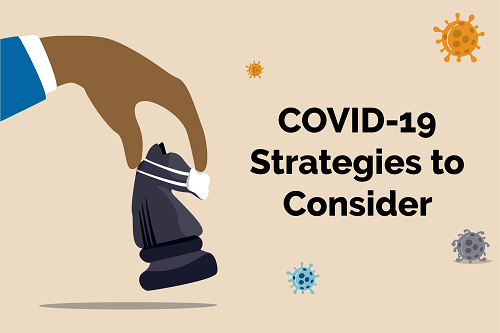

One of the best-loved classics viewed during the Christmas season is Charles Dickens’ A Christmas Carol (see summary here), a story centered around a selfish and unfriendly old man who hates Christmas named Ebenezer Scrooge. It is a story that has been recreated for film, television and the stage more than two dozen times and offers many valuable leadership lessons.
Leadership Lessons from Christmas Past
There is an urban legend regarding an incident about a young pilot in the U.S. Navy who crashed his $38 million F-14 Tomcat and had to appear before the Investigation Board. After providing his perspective on the details of the crash, the young pilot asked an Admiral who was sitting on that Board if he would lose his wings. The Admiral stared at him for a moment and then stated, “Why would we take your wings when the U.S. Navy just spent $38 million dollars training you?”
Good leaders learn from past mistakes and don’t repeat them in the future. Sometimes the best lessons learned come from our mistakes and failures. In A Christmas Carol, Scrooge saw the mistakes he had made and the opportunities that had passed him by. While unable to change the past, he still had the opportunity to learn from his mistakes and ensure they were not repeated in the future. There is no value in berating employees or constituents on what happened yesterday, as you can’t change it. Objectively and honestly analyze your successes and failures and try to learn the lessons that each have to offer.
Leadership Lessons from Christmas Future
Many have attempted to predict future events throughout history. Sometimes, a few got some of it right, but the vast majority missed the mark substantially. The one thing you can be certain about regarding the future is uncertainty. With the rapidly changing circumstances, technology, social reforms and everything else requiring attention in today’s world, an organization must be proactive if it wants to survive in the long-term. As the predictability of future events is generally a best guess based on past history, predictive analysis and other tools, organizational agility and flexibility are essential for success in today’s ever-changing environment.
Are you growing your employees? Are you equipping them with the skills, abilities and freedom to innovate; to be creative and involved in decisions that form the basis for the future of the organization? Is succession planning a viable part of your strategy? Are you grooming the right people to take the leadership reins of your organization in the coming decades? Have you studied and learned from the past? Are you doing things differently based on what you have learned? Is your organizational culture one of empowerment and change, focused on the future or stuck in the past doing the same things, in the same way, buried in layers of bureaucracy and mediocracy? Scrooge didn’t just learn from the past, he applied that learning to his future. He was willing to make the changes necessary and provide others with the support and encouragement necessary to succeed.
Leadership Lessons from Christmas Present
Recent studies show approximately 64% of executives struggle with work related stress. This impacts their ability to sleep, relax and their health. If this is true for executives, it is reasonable to suggest that many employees below the executive level of an organization also struggle with similar issues. Holidays are often a mixed bag when it comes to stress at both work and home.
In this season of Christmas, carve some time out of your schedule to relax without the worry of work. Spend additional time with your family, friends, colleagues and employees. Turn off the cell phone and don’t worry about emails for a few hours or a few days, if possible. The holidays will be here and gone before you know it and once gone, they are in the past. Make some warm memories with the ones that you love. Be kind to one another and be generous to those in need.
From all of us at the Strategy Management Group to all of you, we wish you, your family and friends, a wonderful holiday season.
Sources
A Christmas Carol Summary by Charles Dickens. Retrieved from: https://www.sparknotes.com/lit/christmascarol/summary/
Grumman F-14 Tomcat. Retrieved from:
https://www.aircraftcompare.com/aircraft/grumman-f-14-tomcat/
The Stressed Executive: Sources and Predictors of Stress Among Participants in an Executive Health Program, U.S. National Library of Medicine. Retrieved from: https://www.ncbi.nlm.nih.gov/pmc/articles/PMC6196623/
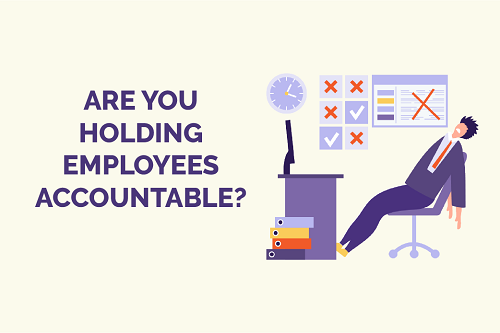
How many times have you tried to implement what seems like the perfect strategy only to fail because you can’t seem to get your employees to make it happen? Oftentimes the success of a strategy execution or performance management system hinges on whether leaders can create a culture of accountability in their organization.
Dr. J. Ed Barnes summarizes two approaches to accountability below. Even though the lists, taken together, read like a simple management 101 reference, I have found that many accomplished leaders and mangers are simply not very good at many of these key skills. The punitive approach is an instructive straw man for how NOT to approach accountability, while the second list outlines basic motivational methods for creating accountability.
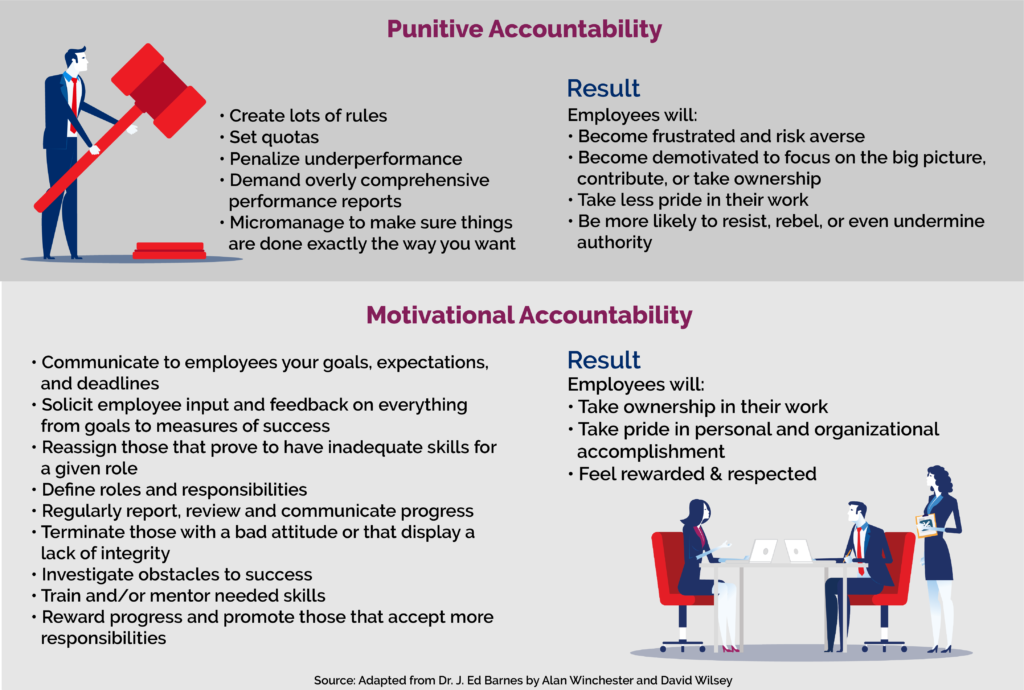
We’ve also created a simple assessment based on the above lists that anyone can use to assess how well your organization is at creating a culture of accountability. Any leader or manager can assess his/her performance by simply reviewing the statement and assigning a score between 1 and 10, with 1 being low.
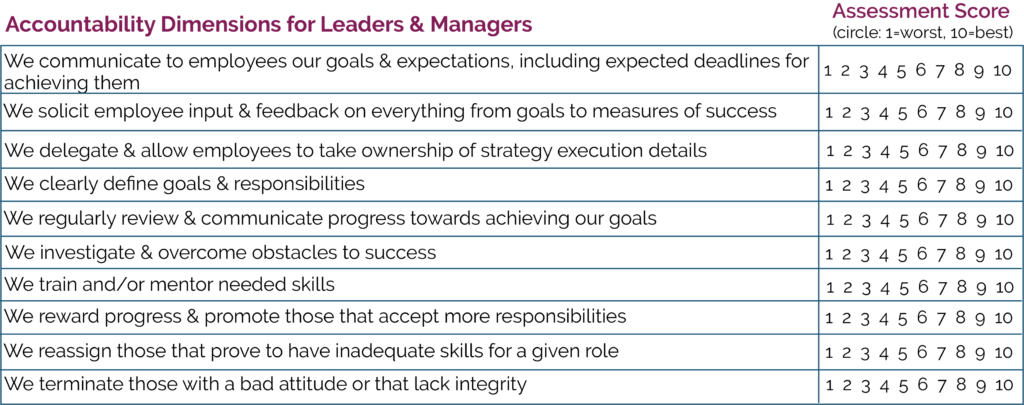
If you scored yourself low on the formulation or communications of goals and expectations, you might investigate our Balanced Scorecard Professional program. If measuring success or reporting progress is a challenge, you might consider our KPI Professional program. If you score yourself low across the board, you might consider our Strategic Leadership course.